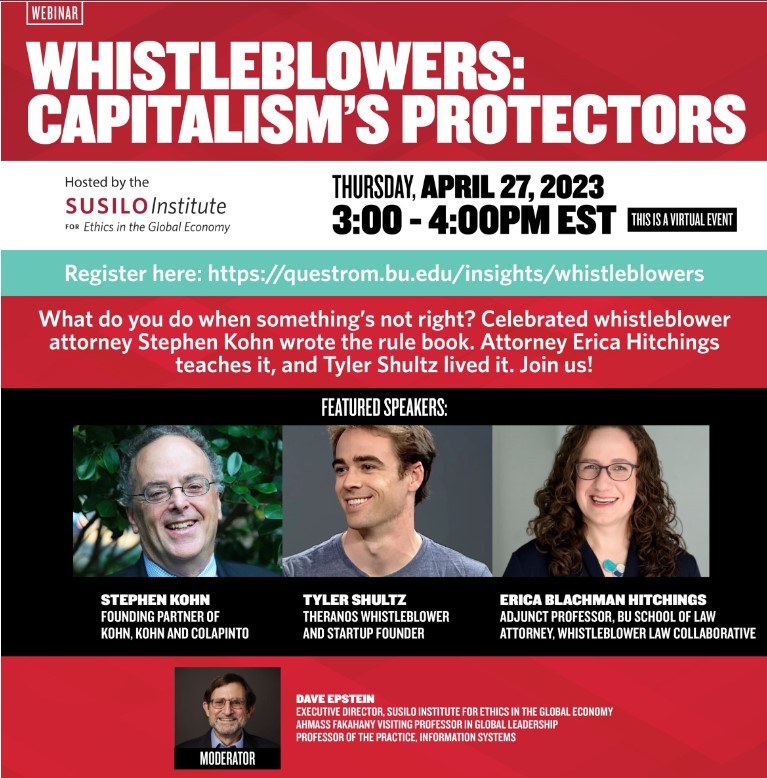On April 27, 2023, WLC attorney and BU Law Adjunct Professor Erica Blachman Hitchings participated in an online panel, titled Whistleblowers: Capitalism’s Protectors. The panel focused on matters important to a potential whistleblower and lessons that each panelist had to share about the whistleblower experience. When and how should one blow the whistle? What whistleblower reward programs are available? What motivates those who come forward?
The event was hosted by David Epstein, the Executive Director of the Susilo Institute for Ethics in the Global Economy, within Boston University’s Questrom School of Business. Joining Erica and David on the panel were Tyler Shultz, famed Theranos whistleblower, and whistleblower attorney and author Stephen Kohn. While Erica and Stephen leaned on their experiences as lawyers, Tyler reflected on his own whistleblower experience.
The full recorded panel is available here.
The Whistleblower Experience: When and How to Come Forward
The panelists offered their thoughts on a persistent question: how does a whistleblower know if it is the right time to come forward?
In Stephen and Erica’s experience, a whistleblower has almost always tried to report questionable corporate behavior internally first. They find something that does not “feel quite right” and flag it for their superiors. Unfortunately, such reporting is often met with silencing or pushback, even when there are company procedures in place to report concerns. This is, after all, what happened to Tyler:
You may only have one small subset of information, and the company is probably going to gaslight you into thinking you’re crazy, but if something feels wrong, it probably is. You should really trust your gut and listen to it and start talking to a lawyer.
–Tyler Shultz, Theranos Whistleblower
As for how to come forward, the advice was clear: find an experienced whistleblower attorney as soon as possible. This is not as hard as one might think. With the explosion of whistleblower reward programs over the past 30 years, a sophisticated bar of attorneys that specialize in working with whistleblowers has emerged. As a result, you can and should find trusted counsel who will take your case on a contingency basis, meaning that you only pay if your claim succeeds.
Whistleblower Reward Programs
During the panel, Erica described some of the popular and long-standing whistleblower programs, including state and federal False Claims Acts, the SEC Whistleblower Program, and the IRS Whistleblower Program. More recently, Anti-Money Laundering Whistleblower Program, the CFTC Whistleblower Program, and the National Highway Transportation Safety Administration Whistleblower Program have joined the ranks.
Erica also noted that False Claims Act enforcement is expanding to meet new challenges. For example, DOJ is pursuing cybersecurity and customs fraud violations under the FCA. Likewise, the SEC and CFTC have expanded their enforcement into new areas like cryptocurrency.
Erica also pointed out that the “fake it ’til you make it” approach taken by Theranos is not unique. There is a lot of venture capital money flowing to tech startups in the healthcare space. With that money comes a lot of opportunity for medical advancement, but also a heightened risk for fraud. That is because healthcare is a highly regulated space, but too few start ups invest in compliance at the beginning. (Read WLC Founder and Managing Member Bob Thomas‘ take on this issue here.)
What Motivates Whistleblowers?
The presence of whistleblower rewards is certainly critical to ensuring enforcement of anti-fraud laws. So too are strong anti-retaliation provisions and opportunities to remain anonymous, as Kohn emphasized.
At the same time, however, as moderator David Epstein pointed out, many whistleblowers possess an “enviable moral compass.” Erica echoed this sentiment, noting:
The vast majority of our clients, both the potential clients and then ultimately people who go through with coming forward, are driven by a moral compass, [and] a fear of patient harm. The reasons are real, and there are things that keep people up at night, and they come to us to help them solve that problem.
–Erica Hitchings, WLC Member
And Tyler Shultz stands as an example of this. He spoke up when no one else did and faced backlash from all directions, including his own family. But he persisted.
The outcome that I got was exactly what I was looking for . . . Time heals all wounds, and I’m starting to see more and more the positive impact that my story has had moving forward. So yeah, I’d say that absolutely I would do it again.
–Tyler Shultz, Theranos Whistleblower
WLC Attorneys Specialize in Guiding Clients Through the Whistleblower Experience
At WLC, we feel incredibly lucky to do what we do. We have a passion for bringing wrongdoers to justice, exemplified by our combined 160+ years of working as government prosecutors and now whistleblower counsel. We admire our clients and stand by them every step of the way.
If you are thinking of blowing the whistle or simply want to know your options, contact us for a free, confidential consultation.

